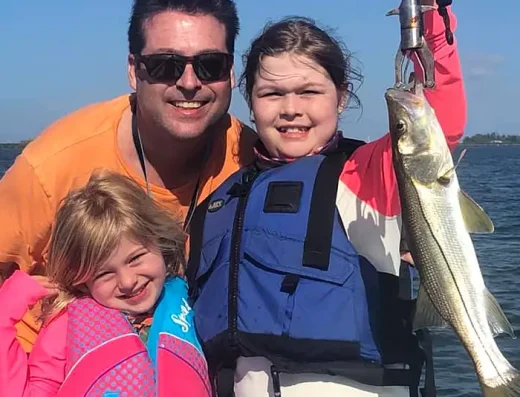Bokeelia Fishing Charters
Bokeelia fishing charters give anglers direct access to Pine Island Sound’s flats, mangrove cuts, and quick Gulf runs for tarpon, redfish, and snook.
Top Rated Charters in Bokeelia
TrustedFish connects anglers with proven local captains in Bokeelia, Florida —no commissions, no pay-to-play listings, no BS. Every charter on our platform is invite-only, vetted for skill, local knowledge, and reputation. If they’re listed, they’ve earned it.
Bokeelia, FL Fishing Guide
Tucked at the northern tip of Pine Island, this low-key outpost is all about the fishing. Most charters here stay inshore and backcountry, running tight routes through Pine Island Sound, Matlacha Pass, and the edge of Charlotte Harbor. You’ll be casting live bait under mangroves for snook, sight-fishing redfish on skinny flats, or drifting for speckled trout in potholes and channels. When tarpon season hits—late spring into summer—anglers chase them from the sound out through Boca Grande Pass and off the beaches.
Trips are usually half-day or ¾-day to stay tight on the tides. Launch spots like Jug Creek Marina or private docks put you on the fish fast—sometimes in under 10 minutes. On the right day, full-day trips push through the pass into the Gulf for grouper, permit, or snapper on nearshore reefs.
Techniques are straight out of Southwest Florida playbooks: shrimp under popping corks, cut bait on the bottom, or freelined pilchards to the shadow lines. Jigs with paddle tails work well for covering water, especially when searching for trout or snook. Fly anglers have great shots at redfish on clear, calm mornings when the tide’s low and the fish are tailing.
Most boats are shallow-draft skiffs or bay boats, ideal for working the maze of mangroves and oyster beds. There’s not a lot of glamour here—just tight runs, local knowledge, and serious opportunities when you fish the tides right.
Fishing Seasons in Bokeelia
Spring (March–May)
Tarpon start showing up in late April, and snook turn on hard as the water warms. Trout fishing stays steady, especially on grass flats, and redfish work the mangroves on high water.
Summer (June–August)
Peak time for tarpon—rolling fish in the pass, the sound, and along the beaches. Snook hold near passes and structure. Early starts are best. Offshore runs, when booked, can find grouper and permit on nearshore structure.
Fall (September–November)
Redfish school up tight on flats and oyster bars, with snook staying active into November. Trout remain consistent, and there’s a surprise bite for juvenile tarpon in protected bays. Pressure drops, but the fishing stays solid.
Winter (December–February)
Cooler temps shift the bite to sheepshead, trout, black drum, and the occasional redfish. Snook go deep but can still be caught with patience. Shrimp is the bait of choice. Wind matters, so guides stay flexible and pick their windows.
Gamefish in Bokeelia
- Tarpon – 50–150+ lbs Seen April–July near passes, beaches, and in the sound. Targeted with live crabs, big threadfins, or flies. Early mornings and strong tides produce best.
- Snook – 5–15 lbs Caught March–November along mangroves, docks, and sandbars. Free-line live bait or work jigs and soft plastics during tidal movement.
- Redfish – 4–12 lbs Fall is prime. Look for them schooling on flats and pushing along oyster bars. Cast cut bait or shrimp into the edges on rising tide.
- Speckled Trout – 1–4 lbs Available year-round on grass flats and sandy potholes. Use popping corks with shrimp or soft plastics during moving water.
- Sheepshead – 2–5 lbs Winter favorite around pilings, docks, and oyster clusters. Fiddler crabs or shrimp on small hooks are reliable producers.
- Permit – 10–30 lbs Summer target on Gulf reefs—requires a full-day run. Crabs on light tackle near structure is the go-to approach.
- Gag Grouper – 5–20 lbs Summer through fall, out on deeper nearshore reefs. Heavy tackle with pinfish or cut bait gets the bite.
- Black Drum – 5–20 lbs Found in winter in deeper troughs and around structure. Use shrimp or crab on a slow presentation.
- Mangrove Snapper – 1–3 lbs Tight to structure year-round. Good numbers in channels, under docks, or offshore reefs. Shrimp or small baitfish on light rigs.
Bokeelia Fishing FAQs
What types of fishing charters run out of this area?
Most trips stay inshore or backcountry, targeting snook, redfish, trout, and tarpon. Half-days are most common, though some captains offer full-day runs into the Gulf when conditions allow.
Can I book a deep sea fishing charter here?
Yes, but it requires a longer run through Boca Grande Pass. Full-day trips can reach nearshore reefs for grouper, snapper, and permit if weather allows and your captain offers it.
When is tarpon fishing at its best?
Late April through early July is peak season. Fish move through the sound, Boca Grande Pass, and along the beaches. Early mornings and moving tides are key.
Do I need a fishing license?
Bring your fishing license, warm layered clothing, lunch, and motion sickness meds if needed. Most gear is included.
Where do local charters usually launch from?
Yes, as long as it meets legal size and bag limits. Most charters will clean your catch, and local processors offer vacuum sealing and shipping.
What kind of boats do local captains use?
Expect shallow-water boats—mostly flats skiffs or bay boats—perfect for navigating tight mangrove cuts, flats, and shallow bays.
Is fly fishing an option here?
Definitely. Fly anglers come for redfish and snook in skinny water, especially on calm days with good visibility. Fall and spring offer great sight-casting conditions.
Are there kid-friendly or beginner charters?
Many are. Let the captain know in advance so they can plan shorter trips or calmer water targets ideal for young anglers.
What should I bring on my charter?
Sun protection, snacks, drinks, polarized sunglasses, and a camera. Most captains provide rods, bait, tackle, and licenses—and will clean your catch afterward.


